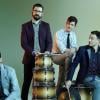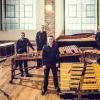
One day in 2006, Steven Schick decided to take a walk. A very, very long walk. He started out in San Diego, his home, and headed north, hugging the coast. He ended up in San Francisco.
As one of the world’s foremost classical percussionists, Schick is known for throwing himself into challenging projects. But this undertaking was on another level altogether.
“I had fantasized for a long time about taking a long walk,” he recalled. “I remember as a kid growing up on a farm, walking along the rows of soybeans and imagining what would happen if I just kept walking. I could escape the farm and all the work I had to do. That juvenile fantasy stuck with me.”
That grueling 2006 hike ultimately inspired a work of art: George Lewis’s Soundlines for voice and solo percussion. It’s one of the many highly creative pieces Schick performs on his new three-CD set, Weather Systems II — Soundlines: On Language and the Land (Islandia Music Records).

The set is the second of three Schick is releasing as he enters what he calls “the final phase” of his long and multifaceted career. A distinguished professor of music at UC San Diego, he is well known among new-music aficionados, having served as artistic director of the San Francisco Contemporary Music Players and as founding percussionist of the Bang on a Can All-Stars. He will give four solo performances at Z Space in San Francisco Dec. 15–17, presented by the Paul Dresher Ensemble.
His new CD set features one of the founding works of the solo percussion repertory, Iannis Xenakis’s 1975 Psappha, as well as other pieces Schick has played over the years and a few new finds. He talked about the project and his approach to music in a telephone interview, which has been lightly edited for concision and clarity.
Tell me about this stroll you took up the coast in 2006. Why on earth did you decide to walk from San Diego to San Francisco?
I had set aside the summer to learn this big piece, but it was canceled. I had a bunch of time, so I thought I’d do this crazy thing I had long thought about doing. I had been walking for three or four days when I realized that what I was doing was walking to San Francisco to propose to my now-wife Brenda, who was living in the Bay Area. So that’s what I did.
Was the idea to surprise her?
No, she knew I was coming. I didn’t want it to be a surprise because I didn’t want to walk for seven weeks only to meet her new boyfriend.
Whose idea was it to take this experience and use it as the foundation for a new composition?
I thought this was just a personal thing. Then, in 2017, I was talking with [composer] George Lewis, whom I have known for a long time. I was conducting George’s opera at the Ojai Festival. We were talking about a new piece, and I told him about this crazy thing I had done. I gave him this loose essay I had written based on my contemporaneous notes, and he thought it would make a great radio play. It premiered in 2019, and I recorded it last year.

That’s one of a number of works on this new CD set that combine percussion with spoken word. Is that combination something you’ve been pursuing for a long time?
I have worked with it for many years. There is a subgenre of contemporary percussion music that involves the voice. Perhaps it’s because percussion is so linked to storytelling in traditional cultures. You’re not using your mouth to play an instrument [so it’s technically possible as a performer]. Frederic Rzewski’s To the Earth from 1985 was one of the first ones.
Many of the works on these CDs are pieces you had a hand in commissioning and/or premiering. Others are pieces you have literally played for decades. Does that make this project a bit nostalgic in a way?
The only resistance I have to the word “nostalgia” is that I’m not trying to go back to another time. But in a sense, yes. The first installment [of the three] was sort of a conversation between the 68-year-old me and the 21-year-old me who was falling in love with this music. This one may be about the relationship between me and a much earlier version of myself.
My practice room has gongs all over the place, and they seem to reverberate along [with whatever I’m doing]. I’m really used to that. After [working on Psappha for] 45 years, it’s kind of the way the piece sounds to me. So when I decided to record it, I took along some of my most meaningful gongs — the ones that have personal associations — and I surrounded the setup with them. You can hear a faint resonance of them with every sharp attack.
I gather COVID was something of a turning point for you in terms of your artistic aspirations. Explain.
The pandemic brought all of us to a point of judgment regarding what was the most important to us. [When everything closed down in March 2020,] I was at the height of a conducting frenzy. I was flying back and forth between San Diego, where I was conducting [Benjamin] Britten’s War Requiem, and San Francisco, where I was going to conduct [Olivier] Messiaen’s From the Canyons to the Stars.
Then the shutdown came. It served as kind of a heat map, showing us what we missed the most. Strangely, it wasn’t conducting, as much as I love doing that. What I ached for was practicing. For a little while, I wasn’t able to practice much because I didn’t have access to my studio at the university. That created an absolute itch.
I thought, “Listen to this. This is telling you what you most care about at a time of life when you’re going to have to make decisions about priorities.”
I didn’t turn my back on conducting. I want to emphasize that in case somebody wants to hire me to conduct! But I decided I wanted to rerecord all the solo repertoire I really cared about, along with some new pieces. The notion was that I wanted to know what it would feel like to return to these pieces with an older body but an experienced mind.

I’d like to ask about one other piece on the new set, The Ice Is Talking by Vivian Fung. It’s not unusual to hear contemporary works that attempt to make a statement about climate change, but this one is uniquely visceral, as you are performing it on a block of melting ice. At times, you can actually hear your “instrument” crack as it fades into oblivion.
It was commissioned by Banff Centre in Canada, a place where you can actually see glaciers receding. Vivian spent her youth in Canada and has vacationed with her family in Banff, and she has noticed the shrinking of the ice caps over the years.
The ice block lasts about 90 minutes to two hours before it becomes unplayable. But there’s a sweet spot — a moment when it’s starting to melt — when the harmonics of the ice block are clearer, the voice is more beautiful. The metaphor for climate change is we are enjoying the beauty [of a disintegrating environment], as when pollution leads to beautiful sunsets.
I guess your rehearsals were definitely time-limited.
Yes, and there was a mess afterward, with water everywhere.
This piece also has some personal resonance for you. Among your memories of growing up in rural Iowa is the sound of the ice breaking up on a nearby lake.
I remember that very, very well. On a northern lake, there’s always a day when the temperature rises and the ice starts clearing from the shore. There would be maybe 100 yards of crushed ice undulating in the waves. If you got close enough, it sounded like a wind chime of some sort — a gorgeous tinkling sound.
Another childhood memory is listening to your mother play Chopin on the piano once she tucked you into bed.
She was a good amateur pianist. I have memories of hearing her practice or play for pleasure on the farm after all the kids were put to sleep. Very often, there would be wind at night, so the sound of the wind has always been a part of my memory of Chopin.
When did you discover percussion?
Very early. When the sheet came home from the elementary school listing all of the instruments your child could play, there was a note next to drums that said the parents didn’t have to buy the actual drums — just the sticks. My mother was so frugal. She said, “Great.” So percussion it was. Also, my father’s brother played drums in a rock band. He was my “cool uncle.” I really wanted to be like him.

Did your parents support your goal of becoming a professional musician?
My parents were very loving and very practical. They wanted me to be a musician, but they did not want me to make my living as a musician. Their aspiration was I would become a physician. I thought that’s what I wanted to do until I went to college and found I was practicing rather than studying. In the end, the decision was made for me by my C-minus in biology. That doesn’t get you into medical school. I got my music degree at the University of Iowa.
When I decided to become a musician rather than a doctor at age 18, I realized that I was incurring a debt. I had moved away from a life that would clearly be in service to others to one that was centered on myself. That’s one reason I’m a teacher. It’s my contribution.
The idea that making music is egocentric is somewhat true, of course, but it also seems harsh. You do play for other people, bringing them enjoyment.
Many people have told me that. But in terms of service, it’s not like setting a broken leg.
Did your parents ever come around and accept the fact that you’re a musician?
I’m looking right now, as we’re speaking, at a picture taken in the greenroom of The Kennedy Center the day I gave my first solo concert there. I was in my early 30s. My mother is holding in her lap a pile of programs. One would go to her neighbor, one to the mailman, one to the dentist. I remember looking at that photo not long after she died and thinking, “She wouldn’t have taken all these programs if she wasn’t proud.”
Are you now working on volume three of your CD collection?
Yes. The third one will be called It’s About Time. It’s about rhythm and other uses of time. A good part of it will be a celebration of the 10 years I was with Bang on a Can.
In terms of [live] performances, I’m doing a bunch of stuff. I’m doing a run of Schick Machine at Z Space in San Francisco Dec. 15–17. I’ll conduct the La Jolla Symphony in February 2024 in my new role as their emeritus conductor. And I’m doing a new hourlong piece by Israeli American composer Chaya Czernowin that will premiere in Paris. So I’ll be there for two and a half months in the spring to workshop and perform that piece, which is quite ingenious. That’ll be right around my 70th birthday.




